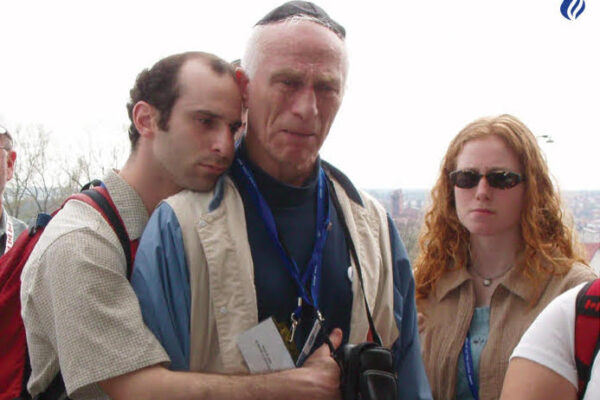TOKYO — A London-based Japanese actor has created a short documentary film that sheds light on individuals who helped Jews escape from Nazi persecution as well as those who have worked to see that this history is passed on.
“There was a Japanese diplomat who issued visas in defiance of the Japanese government to allow thousands of Jewish refugees to travel to Japan via the former Soviet Union so they could escape from the Holocaust, and there was a man who escorted them from Vladivostok to enable them to head to the United States and other destinations via Japan,” said Junichi Kajioka.
“I also learned about another man, Mr Akira Kitade, who has been digging out the behind-the scenes stories. I wanted to visually document their efforts,” Kajioka, 46, added.
The result is his film, “Sugihara Survivors: Jewish and Japanese, Past and Future.”
Sugihara is diplomat Chiune Sugihara, who was Japanese acting consul in the then Lithuanian capital Kaunas, while the escort was Tatsuo Osako, an official of Japan Tourist Bureau, currently JTB Corp, who repeatedly traveled across the Sea of Japan to help transfer the Jewish refugees to Japan.
Sugihara, often referred to as Japan’s Oskar Schindler, a German who provided Jews with safe haven during World War II and was depicted in the Steven Spielberg film “Schindler’s List,” died in 1986 at the age of 86, while Osako passed away in 2003, also at 86.
Kitade, a former official of the semigovernmental Japan National Tourism Organization, traced the steps of Osako, with whom he had worked temporarily, and published his research in Japanese and English as “Visas of Life and the Epic Journey—How the Sugihara Survivors Reached Japan.”
As part of his investigations, Kitade, 72, also located the family of a Jewish refugee who settled in the United States with the help of Sugihara, Osako and others whose names are lost to history.
Kajioka embarked on his documentary film project after attending a lecture by Kitade in London in 2014. He decided to take a camera and accompany him on his journey to New York, where Kitade delivered a photo of a Sugihara survivor, Sonia Reed, to her daughter.
Kitade was entrusted with the photo, which Osako had kept in a photo album together with those of other six Jewish refugees, and posted them on the website of a Holocaust remembrance site in hopes that they might be identified.
He learned that Sonia Reed, who was originally from Poland, and her Jewish husband, who was from Berlin, ran a sheet-metal plant. The Long Island resident died in 1997 at 74, survived by three children.
The film shows the meeting between Kitade and Reed’s family as well as interviews with some Jewish leaders.
They said the Sugihara visas not only saved Jewish refugees but also their descendants, who would not have been born unless the refugees had survived.
“Osako was part of this important history beginning with Sugihara. I intended to present these stories through the activities of Mr. Kitade,” said Kajioka, who started his career in Japan, appeared in movies and TV dramas in China and then moved to London.
He traveled to several cities in Japan with Kitade this summer to screen the 25-minute film and give lectures, and now plans to present an English version at international film festivals, he said.
“People in Europe have faced a massive influx of refugees, and I think that what Sugihara and Osako did for the Jewish refugees will provide us with great lessons when we consider how we can address present-day issues,” Kajioka said.
© KYODO
Originally Published HERE









